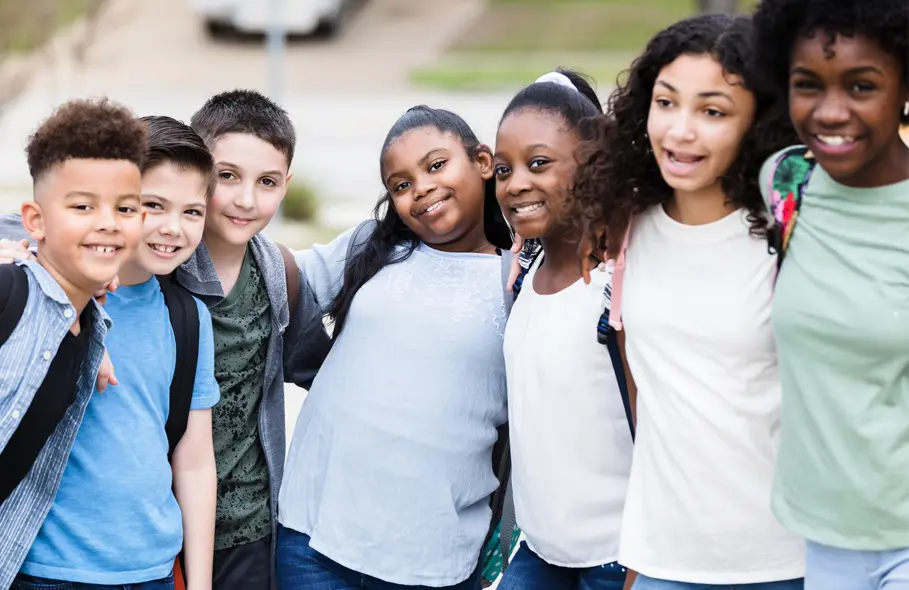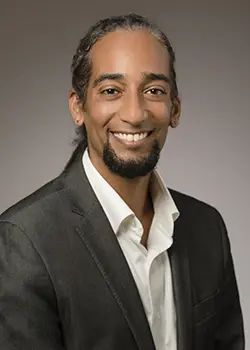Empowering Teachers to Engage Students Through a Justice-Centered Approach
by Tom Hanlon / Mar 21, 2023

Asif Wilson has focused his research on helping teachers learn to engage students through justice-centered and inquiry-based curricular and pedagogical practices.
In 2008, Asif Wilson walked into his middle school classroom on the West Side of Chicago, ready to reach his students, all of whom were Black, through the culturally-relevant curriculum that he had developed just for them.
“I thought, okay, if we follow Black life in Chicago, this will be awesome and the students will love it!” says Wilson, then a first-year social studies and science teacher and now an assistant professor in the Department of Curriculum and Instruction in the College of Education.
The students didn’t love it. (“They didn’t like it in large part because I was teaching Black history through deficit ideologies that positioned my students, their families, and communities as people and places to be saved,” he says.)
In fact, one day, a sixth-grader raised her hand and said, “Mr. Wilson, you need to stop all of this.”
So he stopped. And reflected. And changed.

He changed what the classroom looked like (removing student desks, putting his own desk in a closet, building a library space, creating an art wall, bringing in a pet snake). He changed how the classroom operated (creating space for students to own the classroom, having conversations about their lives, using what was going on in their neighborhoods as the curriculum, giving students space to ask questions and create new knowledge). He changed how he saw himself as a teacher (going through a self-discovery process that impacted how he perceived his students and the reservoirs of knowledge that they possessed).“For me, those are justice-centered pedagogical practices,” Wilson says. “How you conceptualize students, their families and their communities, how you bring their stories and that wisdom and those resources into your classroom to guide both curriculum and your interactions with students, that’s your pedagogical practice. And that experience led me to really start looking deeply at the various forces that influence teachers’ pedagogical practices.”
Finding His Niche
Another change in Wilson’s life also worked. In 2013, Chicago shuttered 49 elementary schools, the largest single closure in the country’s history. Wilson found himself a free agent. He decided to take what he had learned and share it with other teachers. And the best way to do that, he decided, was through higher education.
“I thought I’d be a middle school teacher my whole life,” he says. “It was a tough decision to leave the classroom.”
Wilson, who began his higher education career at the University of Illinois Urbana-Champaign in 2021, focuses his research and scholarship on justice-centered pedagogical praxes in P-20 spaces. “It’s not so much what teachers do in their classrooms but the various factors that create their sensibilities of justice in the classroom,” he says.
His interests include exploring how social movements in local communities’ influence teacher practices, how professional learning experiences affect teachers’ conceptions of their responsibilities and help them gain the tools they need to carry out those responsibilities, and how teachers can be deeply reflective of who they are and the decisions they make as teachers.
“We often think about supporting teachers as ‘windows to the world,’” Wilson says. “As in, ‘If we can just change the way we look out on the world, we can change it.’ Well, part of that work on looking out on the world is creating mirrors too. Mirror work is really about understanding racism, capitalism, patriarchy, and ableism through structures, not through individual analyses that help us to do good service work.”
He gives the example of giving a coat to someone who is cold and calling it “justice-centered work.” “Yes, providing for people’s needs to survive in the everyday world is important, but it’s also important to think about our classrooms as spaces to transform the conditions of the world, not to transform people. As a result, we create better conditions for us to love each other, to be in community, to be well, but the process becomes something different.”
Wilson sees his work as less about doing research than it is about transforming practice. “My work is tied to real lives and stories and the struggles of people,” he says. “The urgency of my work is tied to real people’s lives.
“I want to create more space for practicing teachers and educators who might not be in formal classroom settings to transform. Ultimately, I hope the work I do influences how teachers enact their justice-centered pedagogical practices in their classrooms.”
Leading Multiple Studies
Wilson has built relationships with teachers across the state, aided in part by a grant from the Illinois State Board of Education to support and study Illinois K-12 social studies teachers’ justice-centered and inquiry-based curricular and pedagogical practices. “I’m leading a team of teachers and researchers who are working with two hundred fifty teachers, some from as far south as Cairo, some from the western and central parts of the state, some from the Chicago area, so it’s given me an opportunity to understand the conditions that K-12 social studies teachers are in all across Illinois,” he says. “There are stories in their communities that I want to help them discover, there are pedagogical practices and curricula that are more justice-centered, and I want to help them discover and engage in them. It’s all about how we use scholarship in real time, how we transform practice in the immediate.”
Wilson is also serving as the Clark-Woodson Research Fellow with the Black Teacher Collaborative, which supports Black educators to ensure that Black children achieve at high levels academically while also preparing them to actively participate in advancing their communities. He is conducting three studies through his fellowship: an archival study on Black teachers’ sociopolitical consciousness in Chicago, a study on 50 years of literature on Black teachers’ sociopolitical consciousness, and a study that focuses on working with Black teachers in the South to understand the forces that influence their justice-centered pedagogies.
He also has active awards with Illinois Humanities to study K-12 social studies teachers’ justice-centered and anti-carceral praxes and with the Illinois Federation of Teachers to study justice-centered teacher burnout. In addition, he received the Timuel D. Black Research Fellowship last summer from the Vivian Harsh Research Collective to study justice-centered pedagogical practices of Black teachers in Chicago, and he has been awarded the UIUC Chancellor’s Call 2 Action Grant, through which he will be studying how and why K-12 social studies and English teachers integrated social movements into their pedagogical and curricular practices.
Equipping Teachers for Transformation
In building those relationships with teachers across the state, Wilson is equipping them to transform themselves and their classrooms.
“I do a lot of professional learning with teachers, and now as a researcher I’m able to in those spaces document what’s happening, to make meaning of what’s happening, to create records of what’s happening, not for prescription of what we’re doing but so people can take the lessons we’re learning and contextualize them in their own spaces,” he says. “And then, hopefully, we have some sort of ripple effect where we’re creating nodes of pedagogical justice-centered support and practice and transformation all across the world eventually.”
To that end, Wilson is taking pains to make his documentation accessible to all who want to digest it. “They are in peer-reviewed publications, but I’m thinking about how to present them in ways that are more accessible to the communities and places and spaces that I’m working with,” he says. “We’ve launched a podcast, we have a TikTok channel, and we’re thinking of other forms of media, YouTube videos, that document the scholarship and the lessons that I’m learning to make them accessible to a larger audience outside of academia.”
Pivotal Point for Justice-Centered Work
Wilson’s work is firmly entrenched in the now but with an eye cast to the future.
“We’re at a moment in the country, certainly in the state of Illinois, where teachers want to do justice-centered work,” he says. “So, part of my role as an educational researcher and professor is constructing space to invite teachers in. We have a unique opportunity here in Illinois, where the social science standards have been revised to be more inquiry-based and inclusive. That, for me, is centering justice. I wish this stuff was here when I was a practicing teacher.”
As for the future, Wilson hopes to provide educators “with the energy and agency to engage in the work that will truly transform oppression in the world. Yes, it is a futuristic and lofty aspiration, but that’s why I do this work—in hopes that we can change the conditions of schools to be less oppressive, less harmful, more communal, more loving, more joyous, more transformational, more liberatory, and hopefully those things ripple out into the world.”